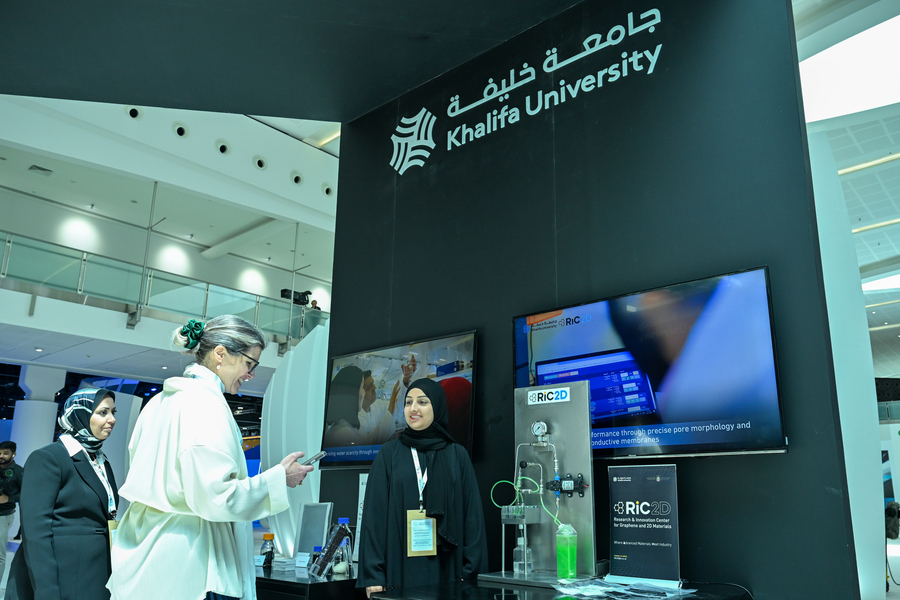Abu Dhabi-UAE: 4 April, 2012 – There is no single solution for the CO2 emissions problem, although a portfolio of solutions is available and carbon capture and storage (CCS) plays a major part of the solutions with a clear direct impact, according to Dr. Mohammad Abu Zahra, Assistant Professor in Chemical Engineering at Masdar Institute of Science and Technology.
Dr. Abu Zahra was speaking at a lecture titled ‘CO2 Post-Combustion Capture: A Novel Solvent System is a Necessity but What Directions to Go?’ The event held at Masdar Institute gathered several students and faculty members.
Dr. Marwan Khraisheh, Dean of Engineering at Masdar Institute,said: “Hosting lectures on highly specialized subjects such as carbon capture by qualified faculty is part of Masdar Institute’s overall offering as an academic institution. These lectures along with other mode of imparting knowledge are designed to enrich the students with a holistic educational experience. We believe the key issues raised by Dr. Abu Zahra will stimulate Interest by students and faculty to carry on research that leads to new innovative solutions. We thank the UAE’s wise leadership for their support in providing the right knowledge developing tools to equip the future generation.”
Dr. Abu Zahra highlighted the industry’s dilemma in finding the novel solvent system inpost-combustion carbon capture, which involves removing the dilute CO2 from flue gases after hydrocarbon combustion. It can be typically built into existing industrial plants and power stations (known as retro-fitting) without significant modifications to the original plant.
Reiterating his recommendations, Dr Abu Zahra said: “Conventional process optimization has major limitations and will result in limited improvement, while improving the solvent capacity will have the major influence on the solvent behaviour. In this context, mixed solvents seem to have better performance than single solvents and combining tertiary amine solvent, especially with an activator (primary amine) is an area of major interest.
“Developing solvents for carbon capture applications require complete evaluation of the overall parameters and long-term bench-scale testing is a must before going into large scale commercialization.”
Currently, Masdar Institute is implementing a carbon capture solvent development and characterization project in collaboration with Massachusetts Institute of Technology (MIT). The two-year project that commenced in September 2011 will aim for the development and characterization of amine-based solvents for short-term post-combustion capture application, as well as developing a carbon-binding organic sorbents for post-combustion carbon capture. The project is led by Dr. Abu Zahra from the Masdar Institute side and by Dr. T. Alan Hatton, Ralph Landau Professor of Chemical Engineering Practice, Department of Chemical Engineering, and Director, David H. Koch School of Chemical Engineering Practice, from the MIT side.
Listing the advantages of the retrofit possibility,Dr Abu Zahra said: “Capture technologies are available and the solvent technologies are proven on a smaller scale. Capture readiness makes the post combustion capture relatively easy to incorporate into power plants. In addition, it has more operational flexibility in switching between capture/no capture mode.” He added that learning by implementing will lead to cost reductions, while ‘learning by exploring’ will lead to better solvents and processes.
Other areas covered by Dr Abu Zahra during the lecture included definition of the conventional solvent-based capture technology; conventional process optimization, challenges and limitations; directions for novel solvents development; global solvent development efforts; and current solvent development research project at Masdar Institute.
Masdar Institute has an existing agreement with Siemens to optimize the technical and economic aspects of environmentally friendly post-combustion carbon capture and storage (CCS).
Established in collaboration with the Massachusetts Institute of Technology (MIT), Masdar Institute integrates theory and practice to incubate a culture of innovation and entrepreneurship, working to develop the critical thinkers and leaders of tomorrow. With its world-class faculty and top-tier students, the Institute is committed to finding solutions to the challenges of clean energy and climate change through education and research.






